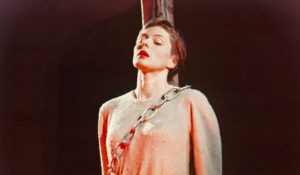I witnessed a mildly Ortonesque moment at the Seven Dials Playhouse the other night. The theatre has recently rebranded the men’s and women’s toilets as “gender-neutral”, meaning that punters of both sexes are invited to play a little game if they wish to relieve themselves. The two doors bear identical labels, but one leads to a cramped and pungent cubbyhole with urinals next to the sinks, whereas the other leads to a spacious and relatively luxurious area complete with individual cubicles. It’s a variation on the old “Monty Hall Problem”. Audience members must pick a door and take their chances, and those who guess wisely are rewarded with a more pleasant experience.
Minutes before the show was due to begin, a flustered woman emerged from one of these doors exclaiming angrily that there were “men pissing in front of everyone”. Given that the show we were about to watch was Diary of a Somebody, John Lahr’s 1986 adaptation of Joe Orton’s diaries, I couldn’t help but wonder who Orton’s targets might be in the context today’s eternally baffling culture wars. Would it be the kind of woman who was clearly upset at having to wash her hands in full view of male genitalia, or would it be the authorities at the theatre who expect her to do so and would presumably brand her a “transphobe” or a “bigot” should she complain?
This revival of Diary of a Somebody includes a running joke delivered by Mrs Edna Welthorpe, an alter-ego of Orton who would write to the press and to theatres in the late Sixties to complain about his plays. She emerges from time to time at a window on the upstage wall, a kind of choric figure expostulating on the evils of our hero. Her words are lifted verbatim from the letters that Orton dispatched under her name. For instance, her letter to the Telegraph described Entertaining Mr Sloane (1964) as an “endless parade of mental and physical perversion”.
Such satire feels more relevant than ever when one considers how the new puritans of “Critical Social Justice” often give the impression of emulating Mrs Edna Welthorpe, with all their talk of how libraries ought to be “decolonised”, their pruning of supposedly offensive comedy shows on streaming services, and their attacks on “problematic” representations in art and literature. In this, Orton had an advantage over the satirists of our time. While he was lauded for lampooning the establishment and breaking taboos, writers who do so today are likely to be chastised by critics and the doyens of the industry for failing to toe the line.
Consider the responses to the West End revival of Jez Butterworth’s award-winning Jerusalem. “Should the play be revived?” writes playwright Bea Roberts. “I’m not sure. I read the script again recently and there’s a lot that feels dated: the laddish chat about ‘birds’ and the racial references… I understand it’s a safe bet for producers, this big, much-loved hit — and I loved it too. But at a time when theatre is grappling with questions of diversity and representation after Black Lives Matter, and when we’re seeing the rise of nationalism post-Brexit, doing a play about defending the homeland and Englishness seems ill-judged.”
Roberts is far from alone in her belief that it is the responsibility of the dramatist to reinforce voguish and ephemeral trends. It seems unlikely that a work as genuinely subversive as Orton’s What the Butler Saw (1967) would ever be commissioned by a major theatre in the current climate. Early drafts would require a thorough going-over by a “sensitivity reader”, and doubtless a director with concerns about how theatrical productions ought to send the “correct message” would mangle whatever glimmers of genius remained.
I’m exaggerating, but only slightly. I have spoken to actors who have found that valuable rehearsal time is often now occupied with interrogating the morality behind the texts, and how the first session begins with each cast member declaring their preferred pronouns. Many avid theatregoers have been turned off because so many productions feel more like sermons than works of art. Critics in the mainstream press are now regularly assessing drama on the putative “message” of the piece, or whether or not they approve of the way in which characters are represented. The star-rating system has always been fatuous, but is especially so if marks are docked for insufficiently diverse casting.
None of which appeared to bother the best critics of Orton’s day. That his appeal has endured is, of course, partly due to the mystery surrounding his gruesome death, the event that Lahr’s play steers us towards with the inevitability of a Greek tragedy. In 1967, Orton was beaten to death with a hammer by his lover and mentor Kenneth Halliwell in their small Islington flat. In his suicide note, Halliwell wrote: “If you read his diary all will be explained. KH. P.S. Especially the latter part.” Yet the final pages were missing.
Some believe that Orton’s agent Peggy Ramsay took the diary from the murder scene and may have removed the final section, possibly to protect someone’s identity. Friends of Orton have testified that he was having an affair and was on the brink of leaving Halliwell, but the man in question has never been named. The theatre critic Michael Thornton was informed by police that he was mentioned in those final pages, and that they had been withheld because they “contained sensitive information about persons still living”. If true, this would scupper the theory that Ramsay censored the document, and would suggest that the solution lies buried in police archives.
Nico Rao Pimparé’s excellent production does not linger over the death itself, or indulge in a crude re-enactment (this was the major failing of Simon Bent’s 2009 biographical play Prick Up Your Ears at the Comedy Theatre in London). Rather, we are left with the image of Orton as he was in life; a puckish and defiant figure who revelled in the joys of his own sexuality. There is no deus ex machina of the kind we remember from What the Butler Saw, no figure from the heavens descending in a great blaze of glory to provide a satisfactory resolution. The final entry in Orton’s diary ends abruptly, cut off mid-sentence; so too the story of his life.
It was his promiscuity that may have been the catalyst to Halliwell’s mania. Orton would leave his diary around the flat in the knowledge that his lover would read his accounts of sexual exploits with strangers. This is also why its reliability cannot be trusted. Orton wrote these entries knowing that they would one day be published, and nothing satisfied him more than exasperating the prigs and pearl-clutchers of his day. As he noted when revising What the Butler Saw, “sex is the only way to infuriate them. Much more fucking and they’ll be screaming hysterics in next to no time.”
It was arguably Orton’s time in prison that consolidated this desire to provoke, and that appears to have been the driving motivation in both his life and his work. Orton and Halliwell served six months for defacing books at Islington Library. The pair would add semi-pornographic images to dustjackets, or rewrite the blurbs in the hope of shocking unsuspecting readers. He later claimed that prison “crystallised” his sense of “something rotten somewhere”, and that “the old whore society really lifted up her skirts and the stench was pretty foul”.
While comedy tends to fare badly with the passage of time, relatively recent productions of Orton’s farces have proven hugely successful. The 50th anniversary production of Loot at the Park Theatre in 2017 was one of the best I have seen, and was enhanced immeasurably by a live actor playing the corpse that is stripped naked and bundled about the stage in the escalating mania. It was quite the contrast to the 2012 production of What the Butler Saw at the Vaudeville Theatre, whose fatal misstep was to allow the characters to find their own lines funny. If Orton’s farces aren’t played straight, they simply don’t work.
There are no likeable characters in What the Butler Saw; Orton sees humanity as a parade of degraded creatures, slaves to baser instincts, whose only value rests in being figures of fun for us to pruriently observe. The title invites us to imagine a butler taking a moment from his duties to peer into one of those seaside peepshow machines, popular in Edwardian England. This is what his “betters” get up to behind closed doors. Through his treatment of themes such as police brutality, institutionalised abuse, incest and necrophilia, Orton strips away the patina of respectable society. Whether one finds this cynical or not, it is undeniably funny.
True to the golden rule of comedy, revivals of Orton’s plays are all about the timing. And now that the theatre industry appears to be so ideologically captured, what better time for writers to pick up where Orton left off? In his day, the Lord Chamberlain would ensure that potentially subversive material would not make it to the stage. Today, theatrical practitioners have taken on that role for themselves, embodying the kind of prissy moralisers that Orton took such pleasure in skewering. Mrs Edna Welthorpe is back — and it won’t be long before her skirt gets lifted.
Disclaimer
Some of the posts we share are controversial and we do not necessarily agree with them in the whole extend. Sometimes we agree with the content or part of it but we do not agree with the narration or language. Nevertheless we find them somehow interesting, valuable and/or informative or we share them, because we strongly believe in freedom of speech, free press and journalism. We strongly encourage you to have a critical approach to all the content, do your own research and analysis to build your own opinion.
We would be glad to have your feedback.
Source: UnHerd Read the original article here: https://unherd.com




